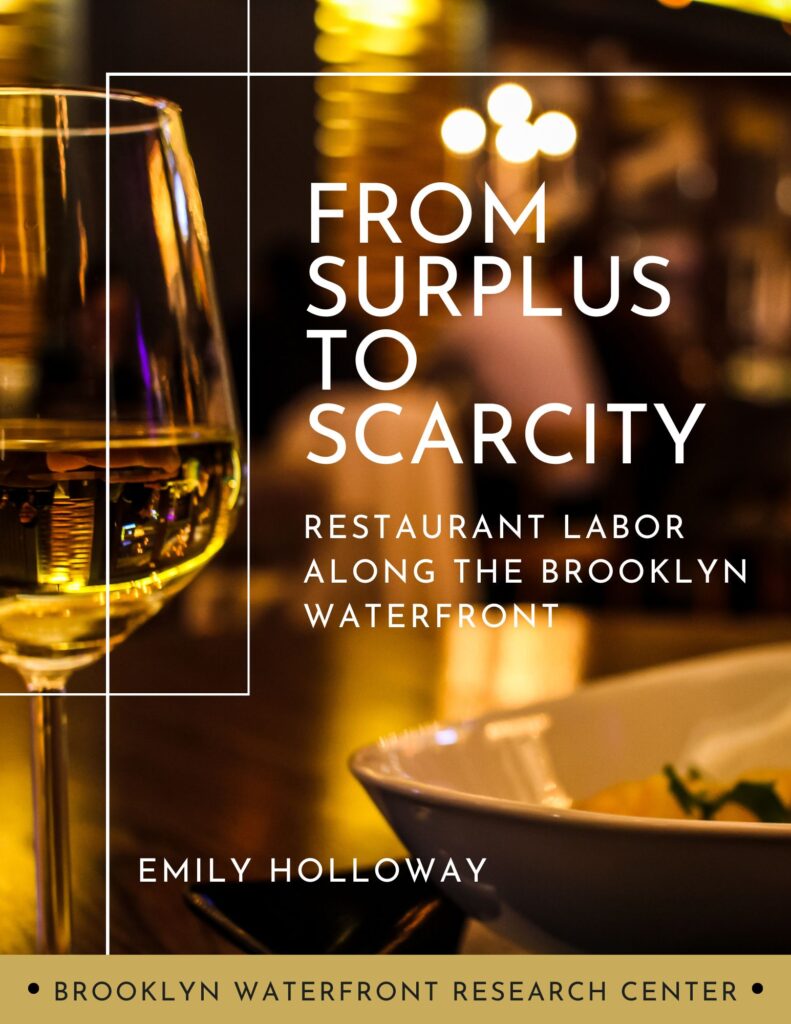2023 BWRC Annual Conference:

The full recording of the conference is now available on YouTube!
This year’s virtual conference dealt with a very timely topic: the evolution of the restaurant industry in the years of the Covid-19 pandemic from 2020-2023. Although President Biden has recently ended the official state of national emergency for the pandemic, the effects of this tumultuous time are still being felt along the Brooklyn waterfront and in New York City at large.
The featured speakers and panelists raised many questions and issues of social inequities, regulations, policies, and practices of restaurants and the hospitality industry that were born out of Covid-19, all of which substantially transformed the industry during the height of the pandemic. Above all, the conference celebrated the restaurant owners, chefs, waiters, delivery workers and other employees who played an essential role in keeping the industry alive in spite of the danger, discrimination, and other adversities they faced and continue to face. One thing that is for certain is that Brooklyn and NYC restaurants will be forever changed—for better and for worse—by the past three years.
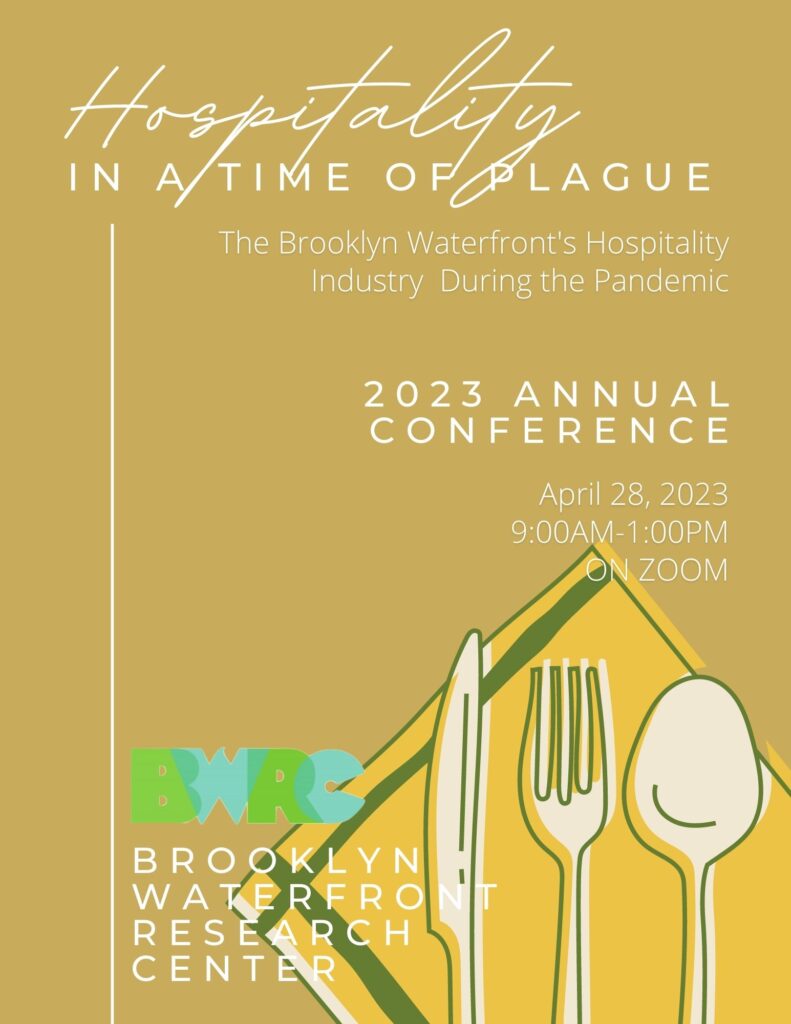
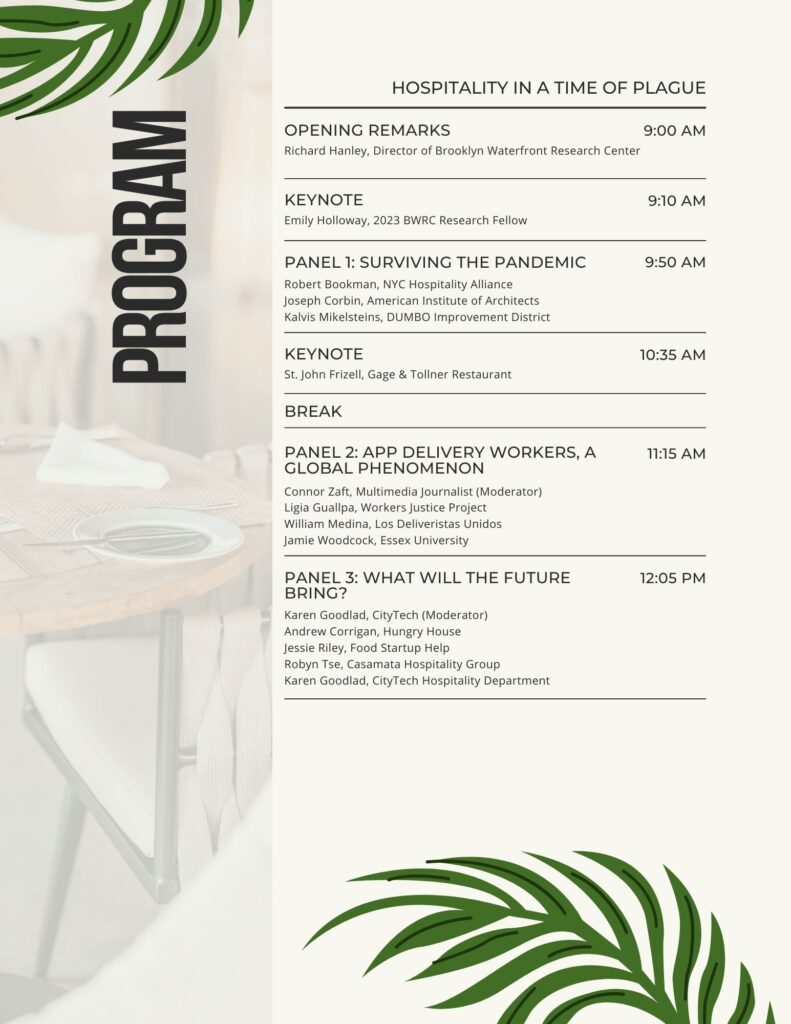
Conference Recap!
The conference featured two keynote speakers who discussed the incredible evolution of the restaurant industry along the Brooklyn waterfront before and during the pandemic years: one from an academic perspective and the other from the perspective of a current restaurant owner.
Keynote 1: Emily Holloway, BWRC’s 2023 Research Fellow, detailed the various ways in which the Covid-19 pandemic upended the restaurant industry. Holloway highlighted the rapid expansion of restaurants along the Brooklyn waterfront in the years before the pandemic, which was largely the result of gentrification and targeted economic development. Restaurants had to adapt in many ways to survive the pandemic by changing how they were staffed and implementing outdoor seating, to name two of the strategies. Holloway explored the ways in which various levels of government sought to assist the industry as it struggled during the pandemic and analyzed the effectiveness of those programs. She also discussed the various inequities prevalent in the industry, including sexual harassment in the workplace and unequal distribution of financial aid during the crisis.

Keynote 2: What happens when an oyster salesman and a cigar salesman get together? During his keynote address, St. John Frizell, co-owner and partner of Gage & Tollner, explored the history of the iconic Downtown Brooklyn restaurant. Frizell took us through the many iterations of the landmark restaurant, including its inopportunely planned reopening in March 2020, just days before the Covid-19 stay-at-home order was issued and the city virtually shut down. But the restaurant, which had already weathered two world wars, prohibition, and the Spanish Flu, was not defeated by the Covid-19 pandemic. Not only is Gage & Tollner alive today, but it is thriving, recently named one of NYC’s best restaurants by the New York Times.

In addition to the two keynote speakers, the conference included one panel that explored the informal sidewalk sheds that have evolved into the more formal Open Restaurants/Open Streets programs, a second that focused on app delivery workers, and a third that gauged some of the permanent changes to restaurants that we can expect—from ghost kitchens, to an extended food delivery program, to a shifting work culture, to the popularization of cannabis cuisine.
Below is a recap of the panels.
Panel 1: “Surviving the Pandemic:” Moderated by BWRC director, Richard Hanley, this first panel focused on the strategies that restaurants put in place to survive the height of the pandemic, in the context of stay-at-home orders, labor shortages, and public health concerns. One of the most important strategies restaurants implemented was outdoor seating. This temporary solution is now permanent for hundreds of restaurants around the city. What eventually evolved into the Open Streets/Open Restaurants program became a lifeline for the struggling industry, responsible for bringing back an estimated 100,000 restaurant jobs according to Robert Bookman, counsel to the NYC Hospitality Alliance.
But building this novel infrastructure within the very limited and highly coveted NYC right-of-way has been a daunting feat, governed by strict rules and regulations unprecedented and unbeknownst to restaurants prior to the pandemic. Fortunately, organizations like Design Corps have been helping restaurants procure the contractors and materials they need to build safe, accessible, and compliant outdoor dining structures. Design Corps’ pro bono work has saved each restaurant they have assisted $20-$30K on building these structures, according to co-founder Joseph Corbin.
Kalvis Mikelsteins, director of DUMBO improvement district described how the implementation of outdoor dining impacted restaurants around the Brooklyn waterfront in particular. Due to its narrow sidewalks and windy weather, restaurants in the DUMBO neighborhood faced especially challenging circumstances in trying to set up dining alternatives. Mikelsteins also spoke about how the pandemic not only changed the physical form of restaurants, but the way that restaurants served and prepared food as well. Some of the restaurants that the DUMBO improvement district has worked with have begun serving frozen dishes or raw ingredients that are more takeout-friendly rather than (or in addition to) the prepared meals they were used to serving pre-pandemic. All of these are adaptive strategies that were intended to be temporary but may offer permanent solutions towards creating more accessible, sustainable restaurants for all tastes.
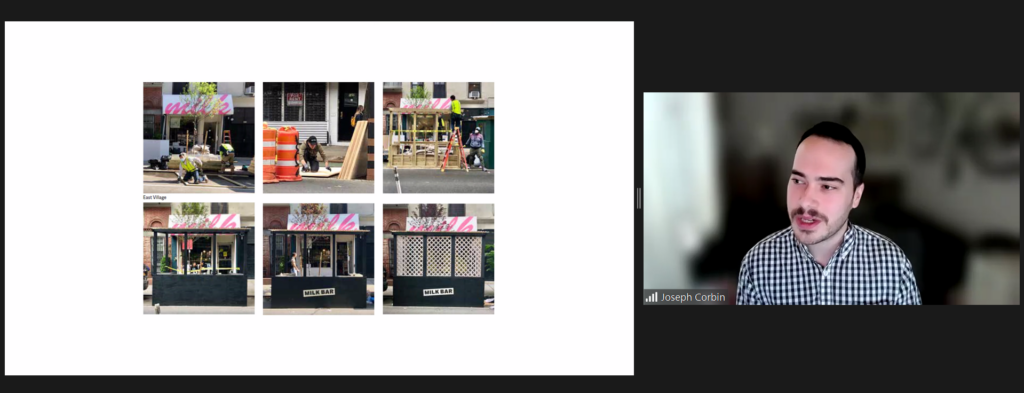
Panels 2 and 3: “App Delivery Workers, a Global Phenomenon” and “What Will the Future Bring?” The remaining two panels of the conference were moderated discussions by panelists who exposed some of the underlying challenges of the adaptations and changes made by the restaurant industry in response to the pandemic. In many cases, these adaptations have exacerbated existing inequities, undermining kitchen staff and delivery workers who are often “invisibilized,” or made to be unseen, by the hospitality industry.
Moderated by photographer Connor Zaft, whose work documents the day-to-day lives of delivery bike workers, Panel 2 featured Ligia Guallpa and William Medina, leaders of Los Deliveristas Unidos, which is a collective of delivery workers fighting for new labor standards in the app-based delivery industry. Both Guallpa and Medina discussed the risks delivery workers face, their lack of rights, and how to improve transparency and promote respectful treatment of these workers. In addition, Jamie Woodcock, a researcher of this subject based in the UK, offered his international perspective to remind us that many of the phenomena of discrimination, misunderstanding, and mistreatment of workers is not only a local problem.
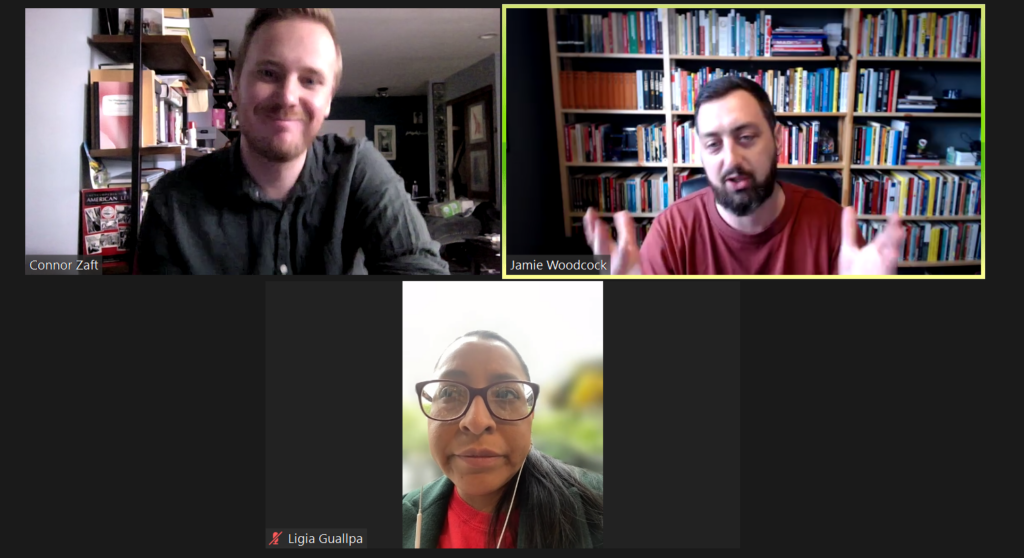
In Panel 3, Robyn Tse, lead of strategy at Casamata, challenged the status quo when it comes to how restaurants are organized, which inherently hierarchizes labor by race, linguistic ability, social status, and gender. Pop culture in shows such as “The Menu” and celebrities such as Gordan Ramsey have unfortunately popularized and normalized the mistreatment and abuse of restaurant workers. Tse urges consumers to be aware of this treatment and only patronize restaurants that offer their workers fair treatment, fair wages, and benefits. According to Tse’s op-ed featured in the New York Times, improving work culture is the best way to build the next generation of more just and sustainable restaurants.
Andrew Corrigan, who joined Tse in Panel 3, challenged another status quo, ghost kitchens. Ghost kitchens are restaurants without a dining room or dining services. They are essentially only kitchens that prepare food in a streamlined way solely for delivery. Some of these kitchens are highly informal and under-regulated. Ghost kitchens became popular in 2010s as a way for restaurants to cut costs; their invention was further fueled by the Covid-19 pandemic and the stark rise in the popularity of food delivery that came with it. Corrigan is the head of operations at an “anti-ghost kitchen,” Hungry House, which strives to help cut the same costs that ghost kitchens do by removing in-house dining services, but adding an important layer of transparency, such as open windows and strong community engagement so that consumers know that their food is coming from a trustworthy source that treats its workers well. In this way, Hungry House strives to make the future of dining—which may realistically begin to look more and more like a ghost kitchen as demand for online food deliveries continues to climb—a little more lively and a little less “ghostly.”
Karen Goodlad, associate professor in CityTech’s Hospitality Department, who moderated Panel 3, focused the discussion on this very topic of how the pandemic has shaped the future of the restaurant industry and what we can expect to be in store in the years to come. Another example of a transformation to consider is the newly legalized and popularized ingredient cannabis, which has opened up an entire new realm of possibilities for restaurant cuisine. With this novelty comes a lot of challenges and uncertainty around how this ingredient will be processed and used and how the consumer culture around it will evolve. All of these factors will affect the way that restaurants look, feel, and operate in the future.
Jessie Riley, an adjunct chef instructor in the Culinary Arts program at City Tech, spoke to some of these possibilities, highlighting the fact that there is currently no legal infrastructure in place for the appearance of cannabis cuisine in mainstream restaurants. Because of the psychological effects and recreational use of the plant, this means that restaurants are currently unprepared to incorporate cannabis safely into food, especially around other drugs currently being served, such as alcohol. Currently, alcohol and cannabis can not be sold in the same establishment, so restaurants with liquor licenses (of which there are many) are struggling to adopt this widely popular fad. To learn more about the NYS Cannabis Control Board’s regulations, click here. You can also learn more about NYS Marijuana Regulation and Tax MRTA by clicking here.

Learn more about our featured speakers and panelists!

Robert Bookman is a recognized leader of the New York hospitality industry. Bookman began his legal career as counsel to the New York City Department of Consumer Affairs. He has since specialized in representing small businesses before numerous City and State agencies, the New York City Council, and the courts. In addition to representing individual clients, Bookman also specializes in representing the industry—first as co-founder and counsel to the New York Nightlife Association and now as counsel to its successor organization, the New York City Hospitality Alliance. Bookman is a nationally recognized expert on nightlife business and organizational issues and is a frequent speaker at regional and national conferences. He is quoted widely in the media and is the author of numerous op-ed articles on regulatory issues which have appeared in such publications as the New York Times and the Daily News.

Joseph Corbin is the assistant director of the American Institute of Architects New York Chapter (AIANY). Corbin provides services to architects and designers to engender a greater public appreciation for design in the built environment and to improve the quality and standards of buildings and public space in New York City. In the spring of 2020, Corbin co-founded the Design Corps along with members of AIANY, NYCxDesign, New York City Economic Development Corporation, and Design Advocates to help architects and designers provide pro-bono design services for the Open Restaurants program. Between the summers of 2020 and 2021, the Design Corps assisted more than one hundred restaurants across the five boroughs. Corbin is also the lead organizer of the Open Restaurants Innovation program, a quasi-design competition that provided design concepts to the Alfresco NYC coalition and the Alfresco report, a document received by New York City government agencies to inform the City’s adaptation to the permanent Open Restaurants program.

Andrew Corrigan is the co-founder and head of operations at Hungry House. Corrigan recently completed an MBA at NYU Stern School of Business specializing in Sustainable Business and Global Sourcing. Prior to his career in operations, Corrigan worked as a chef at many of NYC’s finest restaurants, culminating in a stretch as the executive chef at Cookshop in Chelsea. Corrigan was born and raised in Minnesota and holds a degree in Classics from Bard College.

St. John Frizell is an award-winning writer, bartender, and restaurateur. He is the co-founder of Gage & Tollner, the landmark chop house in Downtown Brooklyn; the founder of the Sunken Harbor Club, with locations in Brooklyn and Bermuda; and the owner of Fort Defiance, the critically-acclaimed cafe-bar and general store in Red Hook, Brooklyn. Frizell’s writing on food, travel, and cocktails has appeared in many publications, including Bon Appétit, Saveur, Imbibe, PUNCH, Gourmet.com, Fine Cooking, and Oxford American. His work has been collected in the Best Food Writing series.

Karen Goodlad is an associate professor specializing in food and beverage management at City Tech. Recently she has taught Wines of the New World, Wine and Beverage Management, Perspectives in Hospitality Management, and Internship. In addition to her joy of teaching she is often found working with club leaders, most recently as the City Tech Tea Club Faculty Advisor. Goodlad was named by Total Food Service as a Top Woman in Metro New York Foodservice & Hospitality in 2019 and 2020. She is Certified Specialist of Wine with the Society of Wine Educators. This certification is evidence of her passion for expanding her own knowledge about wine and beverages but also her desire to effectively teach the subject. Goodlad is a proud and active member of Les Dames d’Escoffier, New York, the premier international organization of women leaders in food, beverage, and hospitality. Supporting the organization’s mission in support of education, advocacy, and philanthropy, she moderated the inaugural wine trends conference, The Next Big Sip. Her academic publications highlight her work as an educator and cover topics such as place-based learning, the first-year transition to college, and wine education.

Ligia Guallpa is the co-founder and executive director of the Worker’s Justice Project (WJP) and Los Deliveristas Unidos. For more than twelve years, she has been organizing New York City’s day laborers, construction workers, domestic workers, and, most recently, app-based delivery workers to build a government and economy that works for all. Under her leadership, WJP launched Los Deliveristas Unidos—the country’s largest workers’ collective that represents 65,000 app delivery workers and is organizing to advance the rights of app-based delivery workers in NYC. Guallpa is currently leading some of the most important issues of our time, including immigration, workers’ rights, climate change, and runaway inequality. Guallpa was named as New York City’s Labor Power 100 leader by City & State New York for protecting app delivery workers from powerful tech companies.

Emily Holloway is BWRC’s 2023 Guest Research Fellow. Holloway is a PhD candidate in Geography at Clark University. Her dissertation project, entitled “Domino in the Longue Durée (1791-1887): Racial Capitalism and the Urban Question,” explores the prehistory of the Domino Sugar Refinery in Williamsburg, Brooklyn, through the lens of Caribbean sugar slavery in the nineteenth century. Holloway has a master’s degree in urban policy and planning from Hunter College and a bachelor’s degree in government from Smith College. In addition to her academic research, Holloway has worked as a researcher and policy analysis intern at the University of Pennsylvania’s Center for the Preservation of Civil Rights Sites, the Bronx Cooperative Development Initiative, the New York City Public Advocate’s Office, the Urban Manufacturing Alliance, and also worked as a project coordinator and researcher with the Brooklyn Waterfront Research Center.

William Medina is a member-leader of the Worker’s Justice Project and leader of Los Deliveristas Unidos, a collective of delivery workers fighting for new labor standards in the app-based delivery industry.

Kalvis Mikelsteins is an urban planner and public space manager born In Hamilton, Canada. As Director of Planning & Operations at the Dumbo Improvement District, he manages all things public-realm related in the Brooklyn mixed-use waterfront neighborhood. Mikelsteins lives in Sunset Park and enjoys exploring the city by bicycle.

Jessie Riley is a founding partner of Food Startup Help and responsible for the original business concept. Riley graduated from New York University with a master’s degree where she also taught graduate level courses in the arts program. After deciding to pursue a lifelong interest in food through more formal training, Riley graduated with highest honors from the professional program at the Institute of Culinary Education (ICE). She then worked at NYC restaurants, a bakery in France, and a wholesale production bakery in NYC. Riley has taught professional culinary classes at Kingsborough Community College in Brooklyn, where she also worked on curriculum development and cost controls. For the past several years, Riley has been an adjunct chef instructor in the Culinary Arts program at City Tech (CUNY), where she has taught culinary courses and developed the course “Cooking with Cannabis.” She is now teaching the first section of that course offered at the College.

Robyn Tse is on a mission to improve the workplace culture of the hospitality industry. She leads strategy at Casamata, Enrique Olvera’s hospitality group which includes Pujol in Mexico City and Cosme in New York. Previously, Tse worked on the business side of restaurants in New York and London and across kitchens and dining rooms in Copenhagen and Hong Kong. With experience in management consulting and food tech startups, she brings her business lens to restaurants to not only improve their operations but also their culture, helping lift up the industry as a whole.

Jamie Woodcock is a researcher based in London and a senior lecturer at the University of Essex. He is the author of books including Troublemaking (Verso,2023), Employment (Routledge, 2023), The Fight Against Platform Capitalism (University of Westminster Press, 2021), The Gig Economy (Polity, 2019), Marx at the Arcade (Haymarket, 2019), and Working the Phones (Pluto, 2017). His research is available to read online and has been featured widely in the media. It is inspired by workers’ inquiry and focuses on labor, work, the gig economy, platforms, resistance, organizing, and videogames. He is on the editorial board of Notes from Below and Historical Materialism.

Connor Zaft is a photographer from the Rocky Mountain region of the United States. He works in journalism as well as the performing arts, and currently resides in Mount Vernon, New York. His work can be found at cwzaft.com.


